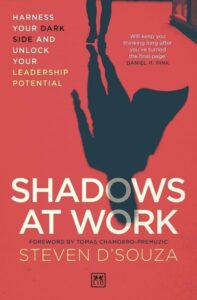
Consider the story of Elena, a leader celebrated for her commitment to open dialogue at work. Her meetings are rituals of inclusivity; every opinion is, in theory, welcomed. Yet, beneath her practiced openness, a different dynamic unfolds. Colleagues grow guarded, ideas are measured, and the conversations she hopes to spark grow dim. Elena, it turns out, is not sabotaged by incompetence or ill intention—but by her own shadow, the hidden part of herself desperate to stay in control and avoid criticism. It’s a drama any Netflix series might script, but it’s one played out with quiet regularity in countless organisations today.
This is the territory Steve d’Souza explores in Shadows at Work, a book that asks: What happens when the parts of ourselves we hide—the impulses, fears, and strengths unacknowledged—start influencing our interactions, decisions, and even our culture? The answer, d’Souza argues, is that shadows fuel our conflicts, shape our values, and sometimes steer us away from the very authenticity we prize. Yet he delivers this insight not through jargon or prescription, but with the clarity and curiosity of a natural storyteller.
What is striking about d’Souza’s writing is how easy it is to read, how effortless it feels to grasp each concept. He navigates the deep waters of Jungian psychology with a conversational tone, often returning to pop culture as his compass—referencing everything from superhero origin stories to tech scandals to decode the language of the workplace. It is a style reminiscent of Gladwell’s own: familiar, inviting, occasionally subversive. A reader will find themselves nodding in recognition as d’Souza draws parallels between boardroom politics and television drama, or between a manager’s unexamined anxiety and a character’s reveal on a streaming hit (Succession anyone).
The true value of Shadows at Work lies in how d’Souza reframes hidden weaknesses as untapped sources of strength. He presents the hidden “Golden Shadow” within each of us, drawing comparisons to icons like Oprah Winfrey, whose empathy arose not in spite of hardship but because of it. The challenge, he writes, is not to banish these shadows but to integrate them, to bring your whole self to work and, in doing so, unlock new depths of connection, creativity and leadership.
As with all great storytelling, the book leaves us less with answers than with better questions. What is the shadow in my work? How does it shape my team? And what would happen if I chose to see, not suppress, those hidden influences? Steve d’Souza’s lesson, wrapped in pop culture and gentle provocation, is that embracing our shadows might be the key to more human, resilient organizations. For anyone who wants their leadership and culture to move beyond surface-level fixes, Shadows at Work is an accessible, timely, and ultimately transformative read.
Check out Shadows at Work here.